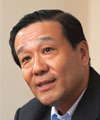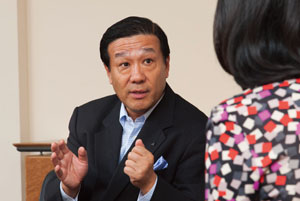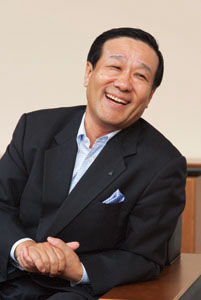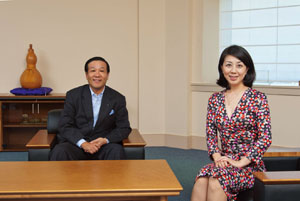 |
|||
|
|
|||
|
View from the Top Vol. 10, No. 11, pp. 1–4, Nov. 2012. https://doi.org/10.53829/ntr201211tp1  Achieving Dramatic Gains in Domestic and International Markets through RemarketingOverviewTo respond to the accelerating globalization of the information and communications technology (ICT) market, NTT DATA is enthusiastically working as a unified enterprise to establish a dominant presence in world markets through its Global One NTT DATA system. Using novel strategies and viewpoints, Toshio Iwamoto, the new President and Chief Executive Officer, has demonstrated outstanding ability as a project manager throughout his years at NTT DATA. After our previous talk with him two and a half years ago, we sat down with him again to discuss the company's new Medium-Term Management Policy. Understanding society's needs and structural changes through fresh viewpoints and up-to-date information—Congratulations, Mr. Iwamoto, on your appointment as President of NTT DATA. Could you tell us what you would like to accomplish going forward? There are various things that I would like to accomplish in the years ahead, and in this regard, let me tell you about the two main pillars of our new Medium-Term Management Policy. One is becoming a Global Top 5 player, which is quite a challenge, and the other is improving our corporate value to an earnings-per-share (EPS) of 20,000 yen. At present, we are ranked no. 6 in terms of market share in global information technology (IT) services. In other words, we are just one rank away from entering the top 5, but there is a large gulf between ranks 5 and 6. Growth is the root of corporate activities, and to provide our customers with top-notch, compelling services, we plan to execute an all-out growth strategy that integrates the abilities of both domestic and overseas companies in the NTT DATA Group. To meet our EPS target, we are strongly committed to improving our corporate value as demanded of a global enterprise. We intend to do this by helping our customers raise their earnings and creating new value for society. To reach an EPS of 20,000 yen, we must raise our net profit by around 10% annually over the next four years, which is no small challenge. In all sincerity, I would like to work toward this goal together with all 60,000 or so NTT DATA Group employees working in Japan and overseas.
A new strategy unfolding under the keyword "remarketing"—Do you have a specific strategy for accomplishing these objectives? We actually have three concrete strategies here: remarketing; major reform of software production technologies; and expansion, enhancement, and fortification of global business. Of course, our business activities are based on marketing. It may sometimes happen that we give up on past marketing results, viewing them as ineffective, and then lose faith in all marketing. However, the market environment is changing significantly over time and the technologies of our industry are advancing rapidly. In times past, there were cases in which we simply could not meet the needs of our customers, but nowadays, there are increasingly more cases in which we can satisfy them. I call this the afterimage phenomenon. If we can completely eliminate the afterimage of results obtained by past marketing efforts and take another look at the market from a fresh perspective, then perhaps we can open up new markets in Japan and abroad. This is what I call remarketing, which is an approach that I would like to pursue wholeheartedly. This concept of remarketing also has another meaning: by obtaining a clear understanding of society's needs and the changes in social structures, we should be able to provide new and novel services and create new markets. I would like to pursue these activities on an ongoing basis. For example, the removal of the ban on banks being involved in the insurance business allowed them to sell insurance from bank counters, and in response to this change in social structure, we developed a system for handling such transactions. We also created an e-money system making use of technical innovations. This required extensive work at the time of development, but we take pride in having created a system that pleased our customers and in being able to spread and establish it in society. I feel that NTT DATA can play a useful social role by seizing these opportunities to enter new markets through social changes, the easing of regulations, and technical innovations. By working to cultivate new markets, we can support social progress and help bring about a feeling of well-being and happiness in many people. —NTT DATA has undertaken the development of unique, large-scale systems in the past. On the basis of this experience, what do you think will be the issues confronting Japan in the future and the role of NTT DATA in solving them? In the public sector, there are a number of issues that must be addressed. These include the creation of a new national identity (ID) system and comprehensive reform of social security and tax. Of course, we would like to play an active, helpful role in solving these social issues. Most of Japan's public systems are unique in the sense that each has only a single version. For example, only one customs system is needed in Japan, but I would like to see it applied in such a way that other countries could make use of it too. The financial industry is likewise in a severe situation. If the market changes, then so do the methods used for settlement and associated IT processing. We would like to provide and support outstanding products in pace with those changes. Let me now move on to major reform of software production technologies. In general, the software development process begins with the definition of requirements, which are then used as a basis for basic and detailed design, programming, testing, and shipping. Examining this sequence of tasks, we can see that there are some process flows in which human labor is concentrated. In today's software industry, collaboration with partner companies is the usual choice as a short-term remedy for such a problem. Moreover, we outsource those portions of work that are labor intensive to overseas companies to cut costs. With these things in mind, let's take a quick look at the manufacturing industry. The trend toward automation in production plants is accelerating and it is becoming possible to stabilize product quality and ensure satisfactory levels of quality, cost, and delivery. I often think about whether such a system—which entails a transformation from labor-intensive to knowledge-intensive work—could also be applied to the software industry. What I would like to do here is focus talented personnel and manpower on performing critical design work and extracting and satisfying customer needs. In fact, we faced a similar challenge about 30 years ago, but were not successful in achieving such a laborsaving system. Compared with today, computers were severely lacking in power, and system implementation was costly. Now, however, such a system is possible. We would like to exploit the high performance of today's computers to achieve a major reform of software production technologies. We are already making progress in automating nearly 100% of software development in several large-scale projects, so I think we are getting better in this regard. We would like to become a global leader in such systems and propose a business model created in Japan. Finally, let's talk about global business. At present, we are doing business from offices in 136 cities in 35 countries and regions. Although our expansion to date has centered on mergers and acquisitions, we have been integrating and reorganizing overseas group companies since January 2012, beginning in North America, and have nearly completed the integration of the entire group under the NTT DATA brand. I think that we are finally in the first stage of expanding our global business, and we have already built an environment in which we can quickly provide services to our customers throughout the world, many of whom are Japanese global enterprises. In the second stage of this process, the plan is to link all NTT DATA Group employees worldwide and expand, enhance, and fortify our global business. At the same time, there's more to global business than just talking about ways of expanding business. There are also problems dealing with the merging of cultures and the integration of human resources. We intend to address and solve these problems.
Recognize one's role by zooming in and taking a historical viewpoint—Our previous talk, two and a half years ago [1], left a deep impression on me because you talked about the need for a manager to have firm philosophical convictions and a strong desire to develop business based on those convictions. Now that you have become president, what do you see as your cornerstone in working to achieve NTT DATA's objectives? That would be the way of looking at things. I tell employees that there are two important ways of looking at the world around you. The first is looking by zooming in. Advances in the network are enabling us to understand things in the world around us as if we were taking them in our hands. When something major happens in the world, you should first examine it closely and then consider its effects on roles and activities from a sequence of viewpoints, starting with Japan as a whole and then moving on to NTT DATA, its various sections and projects, your family or the environment immediately surrounding you, and finally yourself. In other words, by first obtaining the big picture of a world trend and then gradually zooming in on yourself, you should be able to understand what you should do and what stance you should take in response to that trend. The second is looking from a historical viewpoint. Treating the question of how far back to look as a separate issue, let's take a look at the history of the Internet as one example. If we consider 1995 to be the first year of the Internet in Japan, we can see that not even 20 years have passed since then. From a world perspective, the diffusion of web browsers is said to have begun in 1993 (although there are various opinions about this), and that too is only about 20 years ago. And what about computer history? Well, the first computer in the world is said to have been the ENIAC in 1946, but even if we include analog computers (as opposed to today's digital computers), the birth of the computer is still barely more than 65 years ago. Against this background, we are now entering an era in which many people are carrying around handheld computers such as smartphones that are having a major effect on personal lifestyle and on government, economic, and business activities. Looking at technology developments in a historical manner does not mean concentrating on just certain points but rather examining such development processes comprehensively and consistently. This approach enables us to foresee how another process may unfold. Applying it to smartphones and looking five years into the future, I can imagine that some kind of device may arise to replace it even without changing the basic smartphone concept, or perhaps the basic form of the smartphone will change. Zooming in or adopting a historical viewpoint in this way lets you understand the present and focus on things to come. I would like us to work toward achieving our objectives on the basis of this way of looking at the world around us. —Mr. Iwamoto, could you leave us with a few words of encouragement for researchers and project managers? To NTT DATA researchers, I would say, "Let's clarify what we want to accomplish through technology development." While asking ourselves what kind of information society needs to be created, let's improve our ability to foresee the near future. To this end, we need to collaborate with other NTT Group companies and form alliances whenever appropriate or feasible. There are various keywords that can be used to describe the work of NTT DATA, such as big data, machine-to-machine (M2M), and sensor networks, but in any case, we take great pride in being a technology company. The tools that technology-development personnel go on to create lie at the heart of what we are. Furthermore, I would like to see us develop Japan-original technologies and services not only for Japan but also for the whole world, and I would like to make investments to that end. To project managers, I would say, "Be philosophers!" Without inspiration and empathy, people will not move. So on the basis of this principle, I would like them to motivate people while having firm beliefs about life. This is a mindset that I want all project managers to have at all times.
Reference
Interviewee profileCareer highlightsToshio Iwamoto joined Nippon Telegraph and Telephone Public Corporation (now NTT) in 1976. After the spinoff of the NTT Data Communications division into NTT DATA Corporation in 1988, he served as Senior Executive Manager of the Settlement Solutions Sector from 2004, Director and Executive Vice President in charge of the Financial Business Sector from 2007, and Director and Executive Vice President in charge of the Financial Sector from 2008. He was appointed Representative Director and Senior Executive Vice President in 2009. He assumed his present position in June 2012. |
|||



